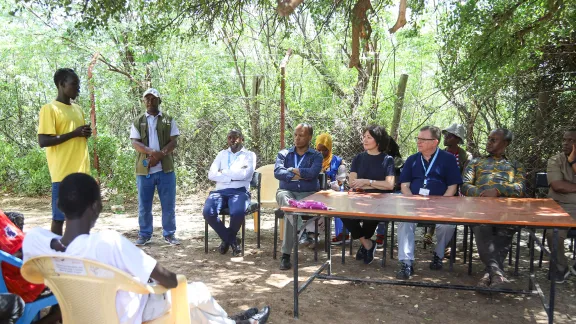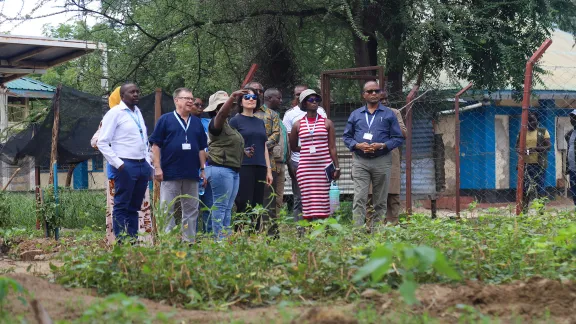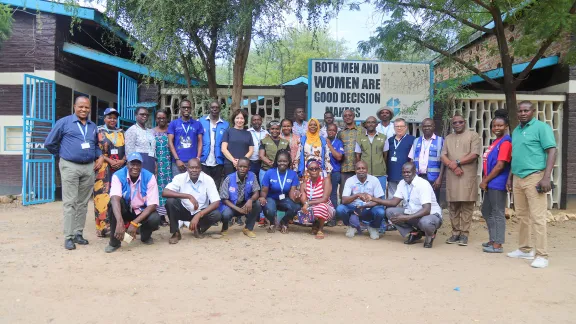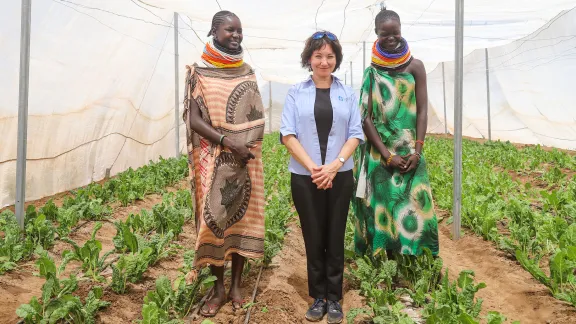
The LWF deelgation listens to youth leaders in Kakuma. LWF Assistant General Secretary for Ecumenical Affairs Rev. Dr Dirk Lange, General Secretary Rev. Dr Anne Burghardt, LWF Kenya-Somalia Country Representative Girma Gudina (behind table, from right) listen to youth leaders from the refugee camp. Photo: LWF/ M. Lukulu
LWF General Secretary visits Kenyan refugee camp
(LWI) - The Kakuma refugee camp in Kenya is one of the largest in the world. The Lutheran World Federation (LWF) has a longstanding presence there, supporting refugees with diverse initiatives. Kakuma is home to almost 300000 refugees, most of whom come from South Sudan and Somalia. More than half of them are young people under the age of 18.
Following a recent visit to the camp, LWF General Secretary Anne Burghardt and Assistant General Secretary for Ecumenical Relations Dirk Lange reflect on their experiences, offering insights into the daily challenges and unwavering resilience they witnessed among both refugees and LWF staff.
Dedicated staff
What stood out to you from your visit to Kakuma?
DL: What left a great impression on me was meeting the LWF staff. They don’t just view their work as a job; they approach it with genuine compassion and commitment. They immerse themselves in the lives and struggles of the refugees, walking alongside them. This deep, shared engagement was inspiring to see.
AB: I wholeheartedly agree. The LWF staff aren’t simply reacting to situations; they’re proactively seeking solutions and innovating where they can. They work well together, supporting each other. I was especially moved by their work in education, their care for people with disabilities, and their efforts to improve the conditions in reception centers, where some people are stuck for a long time, until they receive refugee status.

The delegation visited different LWF working areas in the camp. Photo: LWF/ M. Lukulu
What challenges did you observe, and how are the refugees coping?
DL: The situation is dire in the reception centers. Refugees receive two simple meals a day and live in cramped spaces. We saw five families share a tent of 25 square meters, and this situation often lasts many months. Yet, despite these severe conditions, there’s a palpable sense of hope, largely thanks to the dedication and support of staff. They are attentive and seek ways to help people flourish, even under such difficult circumstances.
AB: Another challenge is related to education. LWF manages the schools in the camp for 80,000 students, but there is a lack of textbooks which limits opportunities. Sometimes, ten students share one book! This is challenging, because education is essential for the future opportunities of young people.
Building peace across communities
How does LWF address the need for peace and community cohesion in the camp?
AB: Given the population size and diversity at Kakuma, conflicts inevitably arise. LWF’s peacebuilding initiatives work across various groups, including youth, women, and local pastors, fostering a collaborative approach to conflict resolution. Religious groups, including Catholics, Anglicans, and Pentecostals, also contribute significantly, helping to nurture spiritual life within the camp.
The peacebuilding work spans different groups, all working toward the same goal of fostering harmony. The peace efforts help build a sense of shared purpose and stability in a challenging environment.

LWF General Secretary Rev. Dr Anne Burghardt with LWF World Service staff in front of the LWF office in Kakuma refugee camp, Kenya. Photo: LWF/ M. Lukulu
What other types of support does LWF provide, especially for young people?
AB: Youth engagement stood out for me, as an area where hope thrives. LWF has organized talent shows, sports programs and even a football championship, called “Kakuma Premier League”. There are girls' and boys' soccer teams competing, it gives them purpose to train for the matches. Some of them are even discovered by talent scouts, they receive professional contracts and make a career outside the camp, which in turn gives hope to other young refugees.
It is inspiring to see former Kakuma residents like footballer Awer Mabil giving back to the community by advocating for education and gender equality, and by providing sports equipment. There’s a real sense of resilience, with former refugees like him achieving international success and then supporting the community.
We met with youth leaders who play a vital role in engaging others, organizing activities, and helping to structure young people’s free time constructively.
DL: LWF’s work also extends to the host community. In our visit to the local Turkana people, LWF staff were helping these traditionally nomadic groups to diversify their diets and learn sustainable agriculture. This work not only helps the local community but also reinforces LWF’s commitment to a holistic mission.

The delegation also met with the host community, here two Turkana women, that the LWF team in Kakuma works with. Photo: LWF/ M. Lukulu
Through this work, we demonstrate that every human being possesses God-given dignity that cannot be stripped away.
Anne BURGHARDT, LWF General Secretary
Upholding human dignity
What would you like the LWF communion and its member churches to know about this work?
AB: Above all, I want the communion to understand that this work is being done on their behalf. In a world where human dignity is frequently under threat, the role of churches and religious organizations in defending it becomes even more crucial. Through this work, we demonstrate that every human being possesses God-given dignity that cannot be stripped away. This mission is important now and it will only become more significant in the future.
How can our readers support this vital work?
AB: The most immediate way to support this work is through direct contributions to LWF's humanitarian work. But equally important is raising awareness in your local congregations about the situation of refugees. To share the stories, pray for these communities, and consider building partnerships with local refugee work. We can all play a role in upholding human dignity – whether through financial support, advocacy, or direct engagement with refugees in our own communities.


